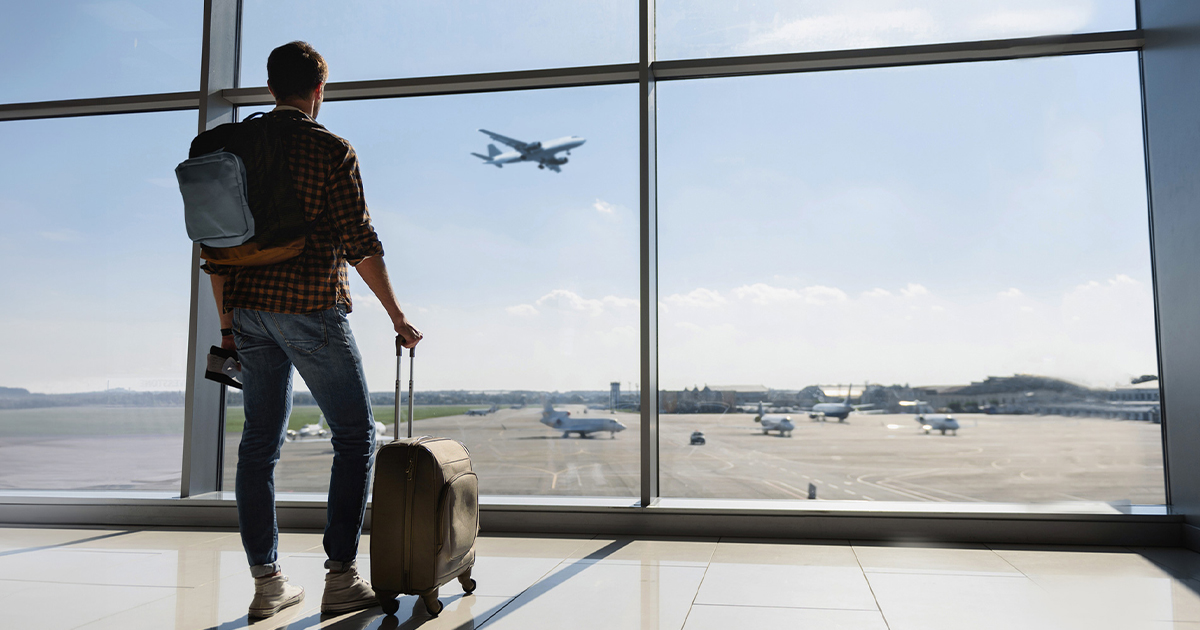Whether you travel for business or pleasure (or both), it’s exciting to explore new places and cultures.
But for many of us, the journey there isn’t always pleasant. Research estimates that up to 40% of people may be moderately apprehensive to fly. And 2.5% may have an intense fear of flying known as aviophobia. For those affected, this anxiety disorder causes significant impairment or distress.
While we may not be able to leave 100% of our flight anxiety on the tarmac, there are steps we can take to reduce it.
5 tools to add to your flight-anxiety toolkit
Explore these coping skills before your next departure. In time, they can help prevent your fears from taking off.
1. Zero in on what makes you anxious
Not everyone’s flight anxiety is fueled by the same thing. Common fears include:
- Feeling a lack of control
- The plane crashing
- Exposure to germs in a confined space
- Feeling claustrophobic or being “trapped in the sky”
- Takeoffs
- Landings
- Turbulence
The first step to managing your flight anxiety is figuring out what, specifically, triggers it for you.

Achieve your mental wellness goals
AbleTo programs give you 24/7 access to tools, activities, and content tailored to your needs. Sign up or log in to start exploring.

2. Educate yourself as much as you can
Knowledge is power. It can help you gain control over your flight anxiety. For example, let’s say your anxiety stems from a fear of the plane crashing. In this case, safety information may help you feel a bit better.
Between 2018 and 2022, the annual number of accidents on commercial flights decreased, according to the International Civil Aviation Organization’s 2023 Safety Report. And transportation safety stats also show that you’re less likely to die in a plane than in a car, bus, subway, ferry, or on foot in many countries.
When I board a plane, I remind myself of these facts. It makes me feel better about my lack of control.
3. Focus on what you can control
This can help prevent other stressors from aggravating your anxiety. I find that the following can help:
- Know your flight details
- Research airport dining and entertainment options before you arrive. That way you can stay distracted and busy before you depart.
- Avoid caffeine and alcohol if they worsen your anxiety
- Arrive at the airport early. Most airlines recommend arriving 2 hours early for a domestic flight and 3 hours early for an international one.
4. Leverage CBT
Cognitive behavioral therapy, or CBT, is the therapy behind many of the techniques and tools within AbleTo. And they can work for flight anxiety, too.
Techniques like guided breathing and meditation work just as well on the ground as in the air. You can find both in your AbleTo program. There’s even a meditation specifically for flight anxiety.
Or mentally rehearse the event, if you feel comfortable enough to try. Envision yourself coping with different scenarios.
For example, picture yourself completing your trip from the safety of your home. Imagine yourself packing. See yourself driving to the airport. Then arriving at the airport. You get the idea. The key is to picture it before you actually do it.
Visualizing the experience, imagining potential outcomes, and calming yourself through it can be done by yourself. Or you can role-play with a friend. It’s a simple practice that can help the real thing feel more manageable and less stressful.
5. Distract yourself
At AbleTo we talk about the CBT principle “face it or replace it.” Here’s how it works: When you’re confronted with a challenge, you can choose to “face it” head-on or “replace it” by distracting yourself from the problem.
Getting sucked into a great movie or book can be the perfect escape from flight anxiety. And the airlines help deliver here, with most flights offering personal screens with an array of entertainment options. Some airlines even let you browse options before you board.
Uninterested in what’s offered? Watch or listen to whatever you prefer on your device. Just be sure to download it for offline access.
Check your fears at the gate
Flying isn’t mandatory. But it is often the most efficient way to travel. And when that’s the case, you deserve to be calm and comfortable on your journey.
Tap into these tools before and during your flight as often as needed. Adventures await and we can’t wait to watch you soar.
Need some support?
AbleTo is here to help. From on-demand self care to virtual therapy and coaching, we make managing your mental wellness easy. Sign up and get the personalized support you deserve.
By Patrick Raue, PhD
Patrick J. Raue, PhD is Professor in the Department of Psychiatry and Behavioral Sciences at the University of Washington. He received his PhD in Clinical Psychology from Stony Brook University in 1995.
Raue is Associate Director for Evidence-Based Psychosocial Interventions at the University of Washington’s AIMS Center and Director of the National Network of Problem Solving Therapy Clinicians, Trainers & Researchers. In these roles, he develops and leads implementation and training programs in a variety of behavioral health interventions.
Raue’s clinical expertise includes the identification and management of mental health conditions in medical settings, including primary care and home health care. He is a clinical advisor to AbleTo.
Clinically reviewed by Hayley Quinn, PsyD, Manager of Clinical Program Development at AbleTo.
Photo by YakobchukOlena/iStock. Individuals in photographs do not represent AbleTo participants.
The information featured on this site is general in nature. The site provides health information designed to complement your personal health management. It does not provide medical advice or health services and is not meant to replace professional advice or imply coverage of specific clinical services or products. The inclusion of links to other websites does not imply any endorsement of the material on such websites.


